Previously, I mentioned winning a beautiful Staub cocotte sponsored by BATS Singapore.
As I was dying to break it in, I wasted no time in cooking a dinner of Osso Bucco using my new cocotte.
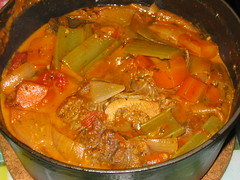
I am pleased to report that the osso bucco virtually cooked itself. Had I been able to procure meatier shanks, the end result would have been even better, but even for a last-minute, hastily-prepared meal, the cocotte worked its magic and the shanks were tender and generously yielded their rich marrow.
However, my true goal was to prepare a Belgian dish: Carbonnades a la Flamande. This typically involves three essential ingredients: beef, onions and beer - basically all you need to keep any man happy. While not a beer afficionado myself, beef and onions are always welcome at my table. From a recipe straight out of Julia Child -
Ingredients (Serves 6)
1.2 kg stewing beef from the chuck or rump, cubed
3 Tbsp olive oil
600g sliced onions
4 cloves garlic, mashed
1 cup beef stock
2 cups light beer
2 Tbsp brown sugar
1 bouquet garni
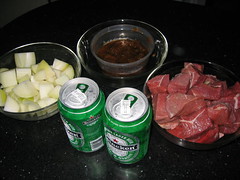
Notes on ingredients: I used "probably the best beer in the world" Heineken, as well as a substantial amount of chuck beef. You can of course always use your own favourite herbs, like thyme and parsley, in more generous amounts.
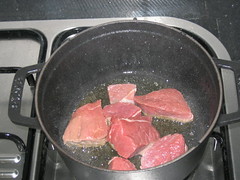
First, as always, heat your olive oil till smoking and brown the beef cubes on all sides.
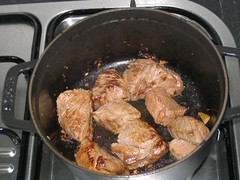
The cocotte gets really, really hot, so it took no time at all to brown my beef. Remove your beef and add the sliced onions.
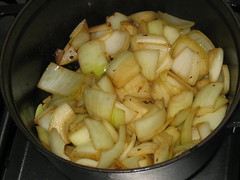
In a similar fashion, saute your onions till they're lightly browned and translucent, then stir in the garlic.
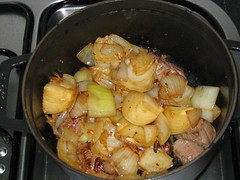
Arrange half the beef in the pot and spread half the onions over the beef.
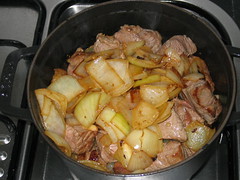
Repeat with the rest of the beef and onions. Who knew cooking could be so simple?
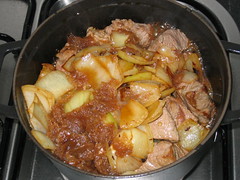
Pour in the beef stock and add enough beer so the meat is barely covered. Bury the bouquet garni among the meat slices.
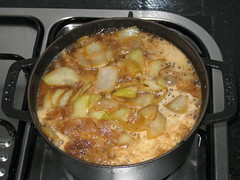
Bring the pot to a simmer on top of the stove. When I first saw the beer and beef combination, I had my doubts, but the aroma of boiling beer and beef stock is truly irresistible. The taste and character of this beer-based stew is quite different from the more common red wine and tomato-based ones.
One of the best things about the cocotte is that it can go straight from the stovetop to the oven, without a corresponding lengthening of cooking time. In fact, cooking in the oven is preferable as the cocotte conducts heat so well it's easy to burn the bottom of some of your stews.
Either way, place in the oven or on the stovetop, maintaining a slow simmer for about two or two and a half hours, by which time the meat should be fork-tender.
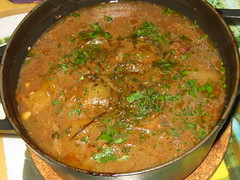
Julia recommends thickening the sauce with some cornstarch, though personally I prefer just reducing it to the desired consistency. Sprinkle over some freshly chopped parsley, and you're ready to serve straight from the pot.
Like all stews, the carbonnade tastes even better after a few hours' rest, and simply heavenly the next day.
Technorati Tags: Recipes, Main Courses, Carbonnades



No comments:
Post a Comment